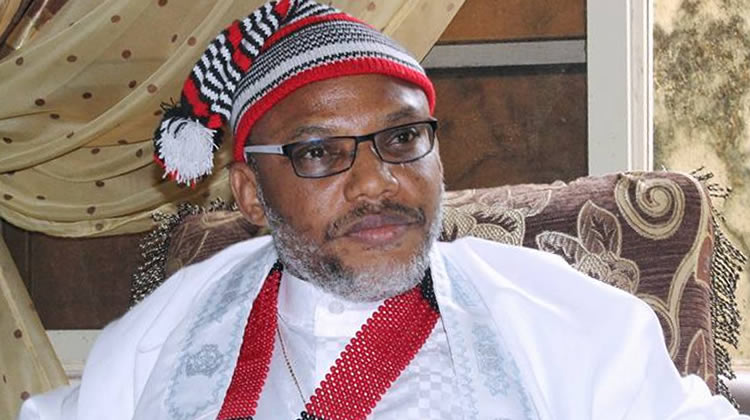A Federal High Court sitting in Abuja Monday, dismissed a N1 billion fundamental rights enforcement suit brought by Nnamdi Kanu, the detained leader of the proscribed Indigenous People of Biafra (IPOB).
Mr Kanu filed the suit alleging that the State Security Service (SSS), which has held him in custody since June 2021, undermined his defence regarding his ongoing trial before the Federal High Court.
However, delivering judgement on the matter, the judge, James Omotosho, ruled on Monday that Mr. Kanu failed to substantiate his allegations and violations of his rights for which he sought N1 billion compensation.
The judgement comes less than two weeks after Mr. Kanu declared his intention to negotiate with the Nigerian government to drop the treasonable felony charges against him.
The SSS is holding Mr. Kanu, a dual citizen of Nigeria and the United Kingdom, over charges of treasonable felony arising from his separatist campaigns for the secession of independent Biafra from Nigeria.
His trial started in 2015 and stalled after he fled the country on being granted bail in 2017.
He was re-arrested in Kenya in June 2021 to continue his trial. The trial judge, Binta Nyako of the Federal High Court in Abuja, ordered his remand in SSS custody throughout his trial.
The IPOB leader filed a fundamental rights enforcement suit before another judge of the Federal High Court in Abuja, Mr Omotosho, accusing SSS operatives of hindering his preparation for his defence in custody.
Mr Kanu, whose bail applications have been repeatedly turned down by the trial court, accused SSS operatives of eavesdropping on the discussions of his defence with his lawyers.
He also accused the SSS operatives of preventing his lawyers from taking notes while meeting with him, sometimes outrightly preventing them from meeting him.
According to him, the SSS operatives also seized and photocopied sensitive documents meant for his defence.
He said these actions impaired his defence for his ongoing trial and amounted to violating his rights.
However, the trial judge, Mr Omotosho, ruled in his judgement on Monday that Mr Kanu failed to provide credible evidence to back the alleged violation of his fundamental rights.
Mr Omotosho held that Mr Kanu failed to substantiate with evidence his claims that SSS operatives denied him unhindered access to his lawyers.
He also ruled that the plaintiff failed to prove his claim that SSS officials eavesdropped on his conversations with his lawyers in preparation for his defence.
The IPOB leader, through his lawyer, Aloy Ejimakor, had sued the Federal Republic of Nigeria (FRN), the Attorney-General of the Federation (AGF), the SSS and its director-general as 1st to 4th respondents, respectively.
He sought “a declaration that the respondents’ act of forcible seizure and photocopying of confidential legal documents pertaining to facilitating the preparation of his defence, which were brought to him at the respondents’ detention facility by his lawyers, amounted to a denial of his rights to be defended by legal practitioners of his own choice.
He also sought “a declaration that the respondents’ act of refusing or preventing his counsel from taking notes of details of counsel’s professional discussions/consultations with him at SSS detention, with said discussions/consultations relating to the preparation of his defence amounted to a denial of his right to be given adequate facilities for the preparation of his defence by legal practitioners of his own choice.
He also sought an order mandating the respondents to jointly and severally pay the sum of N1 billion as damages for the mental, emotional, psychological and other damages he suffered as a result of his rights’ breach.
The trial of Mr. Kanu on charges of treasonable felony recently resumed before another judge of the Federal High Court in Abuja, Bintang Nyako, following a Supreme Court order.
However, the SSS denied Mr Kanu’s allegations and claims in a counter-affidavit filed on 12 March.
Yamuje Benye, a staff member of the SSS legal department who deposed to the counter-affidavit, pointed out 11 paragraphs that he claimed were untrue in Mr Kanu’s affidavit.
He averred that Mr Kanu was in safe and secure SSS custody and not detained in solitary confinement.
According to Mr Benye, the applicant (Kanu) was allowed access to his family members and team of lawyers on his visiting days without any hindrance whatsoever.
He said the IPOB leader was permitted to interact and consult with his lawyers on his visiting days without any interference.
He said at no time did any SSS personnel seize, or confiscate documents brought to Mr. Kanu by his lawyers or any other person.
He added that SSS personnel never denied Mr. Kanu’s lawyers the professional liberty to perform their lawful duty of discussing, consulting and interacting with him.
“Applicant’s lawyers are allowed to moderate size notes or pads for the visit, but the exchange of materials that promotes the IPOB ideals (subject matter of applicant’s criminal trial) were strongly resisted and refused.
“Applicant has consistently requested that various prayer books and religious materials be brought to him as part of his fundamental human right,” the deponent wrote.
Mr. Benye also said another judge of the Federal High Court in Abuja overseeing Mr Kanu’s trial, Binta Nyako, had always maintained that visits to him should always be under supervision in line with best practices all over the world.
According to him, the applicant (Kanu), along with his counsel, was permitted to consult and interact on visiting days in one of the best interview facilities of the SSS to ensure maximum comfort of the applicant and his visitor(s).
The official, who denied allegations that the personnel usually record their interaction during visits, said “there is no basis for eavesdropping and recording of their conversations.” NAN
 Nnamdi Kanu
Nnamdi Kanu
